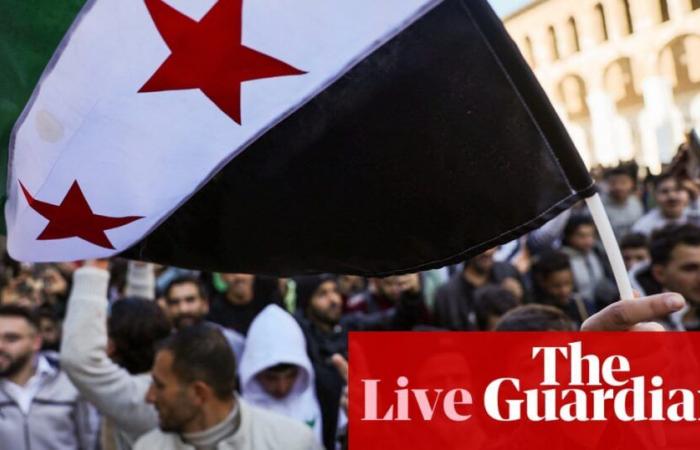
Rebel leader urges Syrians to celebrate in the streets on Friday
The leader of the Islamist rebels that seized power in Syria last week has called on people to take to the streets to celebrate what he described as “the victory of the blessed revolution” on Friday.
In a video message shared on Telegram, Abu Mohammed al-Jolani, the leader of the Hayat Tahrir al-Sham group, who is now using his real name Ahmed al-Sharaa, called on people to “go to the streets to express their joy”.
His call comes ahead of the first Friday prayers since Syria’s new leadership took control. During the early days of Syria’s uprising in 2011, protesters would usually gather after Friday prayers.
He is set to attend Friday prayers at Damascus’s landmark Umayyad mosque.
Key events
Please turn on JavaScript to use this feature
The first Friday prayers since the change of regime are underway, here are a few photos from the wires:
Days after the Assad regime was toppled, it remains to be seen how the change in power will impact Syria’s minorities.
The Kurds, who faced discrimination during the more than 50 years of Assad family rule, have made overtures to the Islamist-led rebels who seized power, but some in the community fear the transition could see it lose the hard-won gains it made during the war, including limited self-rule.
Mutlu Civiroglu, a Washington-based analyst and expert on the Kurds, told AFP that the fate of Syria’s Kurdish authorities “remains uncertain”, particularly as they face “mounting pressure from the Turkish government and factions under its control”.
Syria’s new leaders have said repeatedly that religious minorities will not be harmed under their rule, but they have yet to mention ethnic minorities like the Kurds.
The Catholic Marist Brothers of Aleppo, one of nearly a dozen Christian communities in Syria’s second city, said they were told during a meeting between rebels and local Christian representatives that nothing would change. So far, the statement has proven true, Brother Georges Sabe told AFP.
But he added: “During 13 years of war, I learned to live day by day. We’ll see what tomorrow brings.”
In the southern city of Sweida, the heartland of Syria’s Druze minority where anti-government demonstrations have been held for more than a year, hundreds took to the streets on Friday, singing and clapping in jubilation.
“Our joy is indescribable,” Haitham Hudeifa, 54, told AFP. “Every province is celebrating this great victory.”
The dramatic collapse of Bashar al-Assad’s Syrian regime has thrown light into the dark corners of his rule, including the industrial-scale export of the banned drug captagon.
Victorious Islamist-led fighters have seized military bases and distribution hubs for the amphetamine-type stimulant, which has flooded the hidden market across the Middle East.
Led by the Hayat Tahrir al-Sham (HTS) group, the rebels say they found a vast haul of drugs and vowed to destroy them. HTS fighters allowed AFP journalists into a warehouse at a quarry on the outskirts of Damascus, here’s what they found:
News agency Agence France-Presse is reporting that thousands have gathered at Damascus’s Umayyad Mosque ahead of Friday prayers.
Men, women and children have flocked to the mosque where the leader of the Islamist rebels who seized power last week is expected.
Some raised the Syrian independence flag, used by the opposition since the 2011 uprising, while others chanted: “one, one, one, the Syrian people are one”.
Aya Majzoub, Amnesty International’s deputy regional director for the Middle East and North Africa, has described a visit to the Assad regime’s security and intelligence branches in Damascus.
Here’s what she wrote on social media:
For years, survivors had described the horrors they experienced in these underground dungeons. But nothing could have prepared us for what we saw.
These underground labyrinths are literally hell on earth. They were overcrowded, crawling with cockroaches and other insects, lacked ventilation. They still smell of blood and death.”
Families continue to desperately search for their loved ones in hospitals, morgues and prisons, she said, with some resorting to searching through body bags to obtain some closure.
“But many bodies are beyond recognition, mutilated by years of torture and starvation. Tens of thousands remain missing,” she added.
Turkey to reopen its embassy in Syria
Turkey has tasked a temporary charge d’affaires with reopening its embassy in Syria, according to the state-run media Anadolu Agency.
The Turkish Embassy in Damascus suspended operations in 2012 amid concerns over escalating security problems during the Syrian civil war.
The Associated Press has spoken to Travis Timmerman, the American citizen found this week in the suburbs of Damascus and who said he had been detained seven months earlier after crossing into the country by foot during a Christian pilgrimage.
Speaking from a hotel room in Damascus, Timmerman described his release as a “blessing”.
He said he was among the thousands of people released from Syria’s sprawling military prisons this week. He was freed by “the liberators who came into the prison and knocked the door down (of his cell) with a hammer,” he said.
He said that women had been in the cells above him and that he had regularly heard them singing and teaching their children. He also heard some of the men being beaten regularly. “I was never beaten,” he said.
The 29-year-old didn’t seem bitter about the time he had spent locked up. “It is a time of solace and you can meditate on your life,” he told AP. “It was good for me.”
Here are the latest photos of Syria from the wires:
Rebel leader urges Syrians to celebrate in the streets on Friday
The leader of the Islamist rebels that seized power in Syria last week has called on people to take to the streets to celebrate what he described as “the victory of the blessed revolution” on Friday.
In a video message shared on Telegram, Abu Mohammed al-Jolani, the leader of the Hayat Tahrir al-Sham group, who is now using his real name Ahmed al-Sharaa, called on people to “go to the streets to express their joy”.
His call comes ahead of the first Friday prayers since Syria’s new leadership took control. During the early days of Syria’s uprising in 2011, protesters would usually gather after Friday prayers.
He is set to attend Friday prayers at Damascus’s landmark Umayyad mosque.
Opening summary
Hello, welcome to our live coverage of events in Syria and around the Middle East. It’s a little after noon in Damascus. Here are the major developments:
-
The US secretary of state, Anthony Blinken, is wrapping up a visit to Turkey as part of a broader effort to rally support across the Middle East for a peaceful political transition in Syria. The US administration is worried that a power vacuum in Syria could worsen tensions in the region, already heightened by multiple conflicts, and create conditions for the Islamic State group to regain territory and influence.
-
Blinken said Friday that there’s broad agreement on what both Turkey and the US would like to see in Syria following concerns about the two NATO allies’ competing interests in Syria, as Turkey targets a US-backed Kurdish group seen as key to containing the extremists.
-
Blinken also said he saw “encouraging signs” of progress toward a ceasefire in Gaza and urged Turkey to use its influence to encourage Hamas to accept. “We discussed Gaza, and we discussed I think the opportunity… to get a ceasefire in place. And what we’ve seen in the last couple of weeks are more encouraging signs that that is possible,” Blinken told reporters.
-
G7 leaders are set to gather virtually on Friday afternoon to discuss Syria. The leaders have said they are prepared to support a transition to an “inclusive and non-sectarian” government, and emphasised “the importance of holding the Assad regime accountable for its crimes.”
-
Russia has also reportedly established direct contact with the political committee of Syria’s Islamist rebel group, Hayat Tahrir al-Sham, according to the Interfax news agency, which quoted Russia’s deputy foreign minister, Mikhail Bogdanov. In comments to reporters, Bogdanov reportedly said Moscow aims to maintain its military bases in Syria.
-
Israel’s defence minister, Israel Katz, has ordered the military to “prepare to remain” throughout the winter in the UN-patrolled buffer zone between Israeli and Syrian forces on the strategic Golan Heights. Israel seized the demilitarised zone on Sunday, hours after Syrian rebels ousted Bashar al-Assad.
-
In the US, a former Syrian military official who oversaw a prison where alleged human rights abuses took place has been charged by a federal grand jury with several counts of torture and conspiracy to commit a crime. Samir Ousman al-Sheikh, who oversaw Syria’s infamous Adra Prison from 2005 to 2008 under recently ousted President Bashar Assad, was arrested in July on visa fraud charges.





